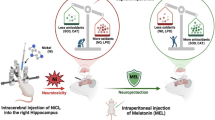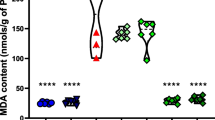Abstract
Objective
To model glucocorticoid-induced cognitive impairment and evaluate the neuroprotection by schizandrin (Sch) against dexamethasone (Dex)-induced neurotoxicity in vivo and in vitro.
Methods
Cerebral cortical cells from neonatal Sprague-Dawley rats (within 24 hours after birth) were cultured for 9 days, and then treated with Dex (10−4, 10−5, 10−6 or 10−7 mol/L) for 24 h or pretreated with 10−4 mol/L Dex for 24 h followed by 10, 20, 40, or 80 μmol/L Sch for 48 h. Cell viability was assessed using the MTT assay. Immunofluorescence and real-time PCR for MAP2 were performed to confirm the effects of Dex on neurite outgrowth. In vivo, kunming mice were randomly divided into six groups: control [(intragastric (i.g.) vehicle for 42 days]; Dex group I (5 mg/kg·d−1 Dex i.g. treatment for 28 days followed by i.g. vehicle for 14 days); Dex group II (Dex i.g. for 42 days); Dex + Sch (Dex i.g. for 28 days followed by 5, 15, or 45 mg/kg·d−1 Sch i.g. for 14 days). Learning and memory were assessed by Morris water maze test. Histological examination was used to assess pathology and apoptosis in neurons.
Results
Compared to the Dex groups, Sch increased cell viability in a dosedependent manner, improved performance in the Morris water maze and ameliorated the morphological changes.
Conclusion
Sch has neuroprotective effects against insults induced by glucocorticoid.
Similar content being viewed by others
References
Joels M. Corticosteroid effects in the brain: U-shape it. Trends Pharmacol Sci 2006, 27:244–250.
Joels M, Krugers HJ. LTP after stress: up or down? Neural Plast 2007, 93202.
Roozendaal B. 1999 Curt P. Richter award. Glucocorticoids and the regulation of memory consolidation. Psychoneuroendocrinology 2000, 25:213–238.
Salehi B, Cordero MI, Sandi C. Learning under stress: the inverted-U-shape function revisited. Learn Mem 2010, 17:522–530.
Sandi C, Pinelo-Nava MT. Stress and memory: behavioral effects and neurobiological mechanisms. Neural Plast 2007, 2007:78970.
Michiels V, Cluydts R. Neuropsychological functioning in chronic fatigue syndrome: a review. Acta Psychiatr Scand 2001, 103:84–93.
Starkman MN, Giordani B, Berent S, Schork MA, Schteingart DE. Elevated cortisol levels in Cushing’s disease are associated with cognitive decrements. Psychosom Med 2001, 63:985–993.
Kwon DY, Kim da S, Yang HJ, Park S. The lignan-rich fractions of Fructus Schisandrae improve insulin sensitivity via the PPAR-gamma pathways in in vitro and in vivo studies. J Ethnopharmacol 2011, 135:455–462.
Lin RD, Mao YW, Leu SJ, Huang CY, Lee MH. The immunoregulatory effects of Schisandra chinensis and its constituents on human monocytic leukemia cells. Molecules 2011, 16:4836–4849.
Lam PY, Leong PK, Chen N, Ko KM. Schisandrin B enhances the glutathione redox cycling and protects against oxidant injury in different types of cultured cells. Biofactors 2011, 37(6):439–446.
Stacchiotti A, Li Volti G, Lavazza A, Rezzani R, Rodella LF. Schisandrin B stimulates a cytoprotective response in rat liver exposed to mercuric chloride. Food Chem Toxicol 2009, 47:2834–2840.
Cheng HY, Hsieh MT, Wu CR, Tsai FH, Lu TC, Hsieh CC, et al. Schizandrin protects primary cultures of rat cortical cells from glutamate-induced excitotoxicity. J Pharmacol Sci 2008, 107:21–31.
Starkman MN, Gebarski SS, Berent S, Schteingart DE. Hippocampal formation volume, memory dysfunction, and cortisol levels in patients with Cushing’s syndrome. Biol Psychiatry 1992, 32:756–765.
Lupien SJ, de Leon M, de Santi S, Convit A, Tarshish C, Nair NP, et al. Cortisol levels during human aging predict hippocampal atrophy and memory deficits. Nat Neurosci 1998, 1:69–73.
Brunner R, Schaefer D, Hess K, Parzer P, Resch F, Schwab S. Effect of corticosteroids on short-term and long-term memory. Neurology 2005, 64:335–337.
Brown ES, Woolston DJ, Frol A, Bobadilla L, Khan DA, Hanczyc M, et al. Hippocampal volume, spectroscopy, cognition, and mood in patients receiving corticosteroid therapy. Biol Psychiatry 2004, 55:538–545.
Bermond B, Surachno S, Lok A, ten Berge IJ, Plasmans B, Kox C, et al. Memory functions in prednisone-treated kidney transplant patients. Clin Transplant 2005, 19:512–517.
Sapolsky RM. Glucocorticoids and hippocampal atrophy in neuropsychiatric disorders. Arch Gen Psychiatry 2000, 57:925–935.
Joels M. Corticosteroid actions in the hippocampus. J Neuroendocrinol 2001, 13:657–669.
Yao YY, Liu DM, Xu DF, Li WP. Memory and learning impairment induced by dexamethasone in senescent but not young mice. Eur J Pharmacol 2007, 574:20–28.
Kim JJ, Diamond DM. The stressed hippocampus, synaptic plasticity and lost memories. Nat Rev Neurosci 2002, 3:453–462.
Sapolsky RM. Chickens, eggs and hippocampal atrophy. Nat Neurosci 2002, 5:1111–1113.
Bremner JD. Stress and brain atrophy. CNS Neurol Disord Drug Targets 2006, 5:503–512.
McEwen BS. Central effects of stress hormones in health and disease: Understanding the protective and damaging effects of stress and stress mediators. Eur J Pharmacol 2008, 583:174–185.
Sousa N, Lukoyanov NV, Madeira MD, Almeida OF, Paula-Barbosa MM. Reorganization of the morphology of hippocampal neurites and synapses after stress-induced damage correlates with behavioral improvement. Neuroscience 2000, 97:253–266.
Landfield PW, Blalock EM, Chen KC, Porter NM. A new glucocorticoid hypothesis of brain aging: implications for Alzheimer’s disease. Curr Alzheimer Res 2007, 4:205–212.
Lupien SJ, McEwen BS, Gunnar MR, Heim C. Effects of stress throughout the lifespan on the brain, behaviour and cognition. Nat Rev Neurosci 2009, 10:434–445.
Author information
Authors and Affiliations
Corresponding author
Electronic supplementary material
Rights and permissions
About this article
Cite this article
Xu, X., Zhou, X., Zhou, XW. et al. Schizandrin prevents dexamethasone-induced cognitive deficits. Neurosci. Bull. 28, 532–540 (2012). https://doi.org/10.1007/s12264-012-1258-y
Received:
Accepted:
Published:
Issue Date:
DOI: https://doi.org/10.1007/s12264-012-1258-y




